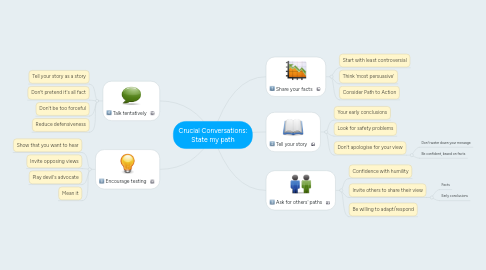Crucial Conversations: State my path
af Liam Hughes


1. Talk tentatively
1.1. Tell your story as a story
1.2. Don't pretend it's all fact
1.3. Don't be too forceful
1.4. Reduce defensiveness
2. Encourage testing
2.1. Show that you want to hear
2.2. Invite opposing views
2.3. Play devil's advocate
2.4. Mean it
3. Share your facts
3.1. Start with least controversial
3.2. Think 'most persuasive'
3.3. Consider Path to Action
4. Tell your story
4.1. Your early conclusions
4.2. Look for safety problems
4.3. Don't apologise for your view
4.3.1. Don't water down your message
4.3.2. Be confident, based on facts
5. Ask for others' paths
5.1. Confidence with humility
5.2. Invite others to share their view
5.2.1. Facts
5.2.2. Early conclusions
